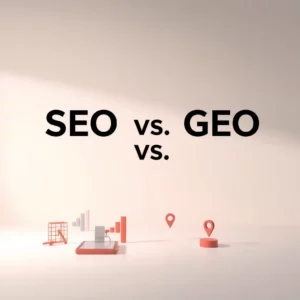SEO vs GEO: Why Affiliate Marketers Need Both Strategies in 2025. The affiliate marketing network is moving so fast you need regular change
Post bt Peter Hanley coachhanley.com
If you’re an affiliate marketer who’s been focusing solely on traditional SEO, you might be missing out on a massive opportunity that’s quietly revolutionizing how people find and consume content online. While you’ve been optimizing for Google search rankings, millions of users have started getting their answers from AI platforms instead of clicking through to websites.
This shift doesn’t mean SEO is dead – far from it. However, it does mean that savvy affiliate marketers need to understand and implement a newer strategy called Generative Engine Optimization (GEO) alongside their existing SEO efforts. Let’s break down what this means for your affiliate marketing business and why you need both strategies working together.
Understanding the Basics: What SEO and GEO Actually Do
Search Engine Optimization (SEO) is something most affiliate marketers are already familiar with. It’s the practice of creating and optimizing content so that search engines like Google, Bing, and Yahoo can easily find, understand, and rank your pages in their search results. The goal is to appear as high as possible when people search for keywords related to your niche.
Generative Engine Optimization (GEO), on the other hand, is much newer. According to Neil Patel’s explanation: “Generative engine optimization (GEO) is the process of creating and structuring content so AI-driven platforms, such as ChatGPT, Perplexity, and Google’s AI Overviews, can easily find, interpret, and cite it in their answers.”
The fundamental difference is in the end goal. SEO wants people to click through to your website from search results. GEO aims to have your content referenced and cited when AI platforms generate answers to user questions, even if users never visit your site directly.
Furthermore, while SEO has been around for decades with well-established best practices, GEO is still emerging, which means early adopters have a significant advantage in establishing authority within AI systems.
How Search Behavior is Changing for Your Audience
Your potential customers aren’t just typing keywords into Google anymore. They’re having conversations with AI assistants, asking complex questions, and expecting immediate, comprehensive answers. This behavioral shift has massive implications for how you should approach content creation and optimization.
Instead of searching for “best protein powder,” users might ask an AI platform “What’s the best protein powder for a 35-year-old woman trying to lose weight while building muscle?” This conversational approach requires different content strategies than traditional keyword-focused SEO.
Moreover, AI platforms often provide complete answers within their responses, which means users might never click through to your website even if your content is cited. This changes how you need to think about content monetization and lead generation as an affiliate marketer.
Additionally, people using AI platforms tend to ask follow-up questions and dive deeper into topics during single sessions. This creates opportunities for comprehensive, authoritative content to establish ongoing influence throughout extended research sessions.
Key Differences in Optimization Strategies
Traditional SEO focuses heavily on keyword placement, meta descriptions, backlinks, and technical factors like page speed and mobile optimization. These elements help search engines understand and rank your content within their algorithmic frameworks.
GEO requires a different approach that prioritizes clarity, comprehensiveness, and factual accuracy. Neil Patel notes that GEO “extends beyond that by targeting AI engines, ensuring your content appears in AI-generated answers.” This means structuring content so AI systems can easily extract and cite specific information.
For affiliate marketers, this translates to creating content that clearly states facts, provides definitive answers, and uses structured formatting that AI systems can parse effectively. Instead of just optimizing for keywords, you need to optimize for question-and-answer patterns that AI platforms favor.
Furthermore, GEO places greater emphasis on expertise and authority signals within the content itself, rather than relying primarily on external validation through backlinks. Your content needs to demonstrate knowledge through specific examples, detailed explanations, and comprehensive coverage of topics.
Practical GEO Strategies for Affiliate Marketers
Start by restructuring your existing content to include clear, quotable statements that AI platforms can easily extract and cite. When you make a recommendation about an affiliate product, provide specific reasons, data points, or personal experiences that AI systems can reference as authoritative sources.
Create comprehensive FAQ sections within your content that directly answer common questions in your niche. These question-and-answer formats are particularly appealing to AI platforms because they match the conversational nature of how users interact with these systems.
Additionally, use structured formatting with clear headings, bullet points, and numbered lists that make it easy for AI systems to extract specific information. This organizational approach helps ensure your content gets cited accurately and in appropriate contexts.
Moreover, focus on creating definitive, authoritative statements rather than wishy-washy opinions. AI platforms prefer content that takes clear positions supported by evidence, examples, or expertise.
The Synergy Between SEO and GEO
Rather than choosing between SEO and GEO, successful affiliate marketers are learning to optimize for both simultaneously. Many of the fundamental principles overlap, particularly the emphasis on creating high-quality, valuable content that serves user needs effectively.
Both strategies benefit from comprehensive keyword research, although GEO requires thinking about conversational queries rather than just search terms. Understanding how people ask questions about your topics helps you create content that performs well in both traditional search results and AI-generated responses.
Furthermore, both SEO and GEO reward expertise, authority, and trustworthiness. The E-A-T factors that Google values align well with what AI platforms look for when selecting sources to cite in their responses.
Additionally, technical SEO improvements like fast loading times, mobile optimization, and clean code structure also help AI platforms access and index your content more effectively.
Measuring Success in Both Worlds
Tracking your success requires monitoring both traditional SEO metrics and new GEO indicators. Continue measuring organic traffic, keyword rankings, and conversion rates from search engines while also developing methods to track AI platform citations and references.
Set up regular audits where you ask AI platforms questions related to your niche and document when and how your content appears in responses. This manual process might seem tedious, but it provides invaluable insights into your content authority within AI systems.
Moreover, pay attention to the quality and context of citations you receive. Being mentioned as the primary authority on a topic is far more valuable than being listed as one option among many generic sources.
Preparing for the Future of Content Discovery
The convergence of SEO and GEO represents the future of content marketing. As AI platforms become more sophisticated and users become more comfortable with AI-assisted research, the ability to succeed in both traditional and AI-driven search will become essential for affiliate marketing success.
Start implementing GEO strategies alongside your existing SEO efforts now, while the competition is still figuring out what these changes mean. Your early adoption of dual optimization strategies will position you as an authority across all the ways your audience discovers and consumes content.
The affiliate marketers who thrive in the coming years will be those who understand that visibility isn’t just about ranking #1 on Google anymore – it’s about being the trusted source that AI platforms turn to when answering their users’ most important questions.
Why we need to keep up with the latest search engine phrazes.
I have learned that understanding GEO and relating it to SEO will become the norm in the same way that understaning LLM (Large Language models) has changed the way we write.
The challenge is no longer about using AI it is about using it better.
Question; What is GEO
Answer: Generative engine optimization (GEO) is the process of creating and structuring content so AI-driven platforms, such as ChatGPT, Perplexity, and Google’s AI Overviews, can easily find, interpret, and cite it in their answers
Question; What is LLM
Answer ; LLM is a type of artificial intelligence designed to understand, generate, and manipulate human language. The “large” in its name refers to two key factors: the sheer size of the model itself (hundreds of billions of parameters) and the massive datasets it is trained on.
The latest AI training is included in your package at Millionaires Apprentice click now

